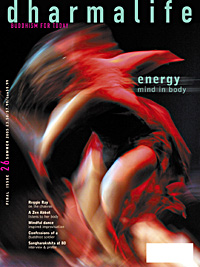An End to Suffering
The Buddha in the World
Author: Pankaj Mishra
Farrar, Straus & Giroux 2004, $25.00; Picador 2004, £17.99h/b, 432pp
Like many literary youths just out of college, Pankaj Mishra dreamt in his early 20s of being a writer. He holed up in the Kashmiri Himalayas of his native India to read and reflect, and he found his imagination caught by the maroon-robed Ladhaki monks. Dreaming of writing a novel about the Buddha, he started to study Buddhism, and though the novel never materialised, An End to Suffering recounts how those explorations accompanied Mishra's growing success as a journalist, travel-writer and novelist. This personal exploration is the frame around which the book weaves a discussion of the Buddha and his ideas.
Based now in London, New York and Delhi, Mishra is a commentator on world events and the emotions that underlie them. An End to Suffering describes how his initial admiration for the Buddha became a fascination with Buddhism's philosophy and psychology, which withstood his scepticism, however strong it grew, and remained impressive, however powerful the western alternatives with which he made comparison. Lucid, well-read and eloquent, Mishra's story offers an engaging and stimulating tour through the landscape of Buddhist ideas and their encounter with modern, especially western, culture.
Mishra's admiration for Buddhism retained an element of distance, as he could not see how it connected with the world that surrounded him: an India soothing the discontents of modernisation with religious slogans; the Moslem youths radicalised by the humiliating discovery of their exclusion from global modernity. He responds with disdain to the political activist western friend who becomes a Tibetan nun - her Buddhism seems to him more like vanity than an authentic fulfilment of her ideals.
But as Mishra matures, both as a person and in his understanding of Buddhism, his appreciation grows and he sees its profound contemporary relevance. Echoing Marx's comment - that philosophy describes the world, but the point is to change it - Mishra writes that the Buddha 'not only diagnosed the new spiritual and intellectual impasse faced by human beings at a time of tumultuous change; he had also tried to overcome it. In the process, he undermined many assumptions behind the political and economic arrangements of the modern era'.
This analysis, as well as Mishra's obvious sincerity and the quality of his writing is what makes An End to Suffering stand out. It does not quite add up to an argument for Buddhism - it is too meandering for that - but it is well-judged to bring a Buddhist perspective into mainstream discussions of cultural and spiritual life.
Vishvapani



